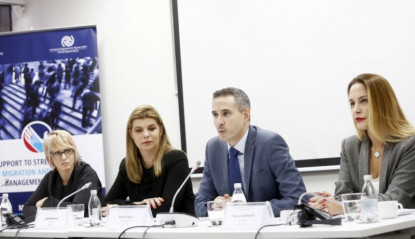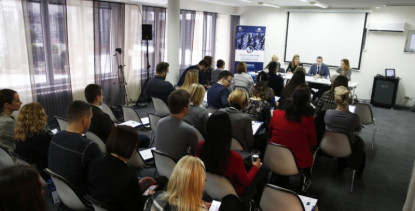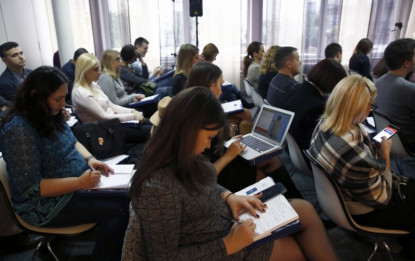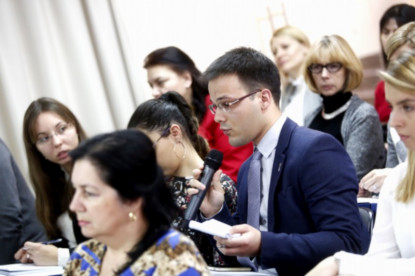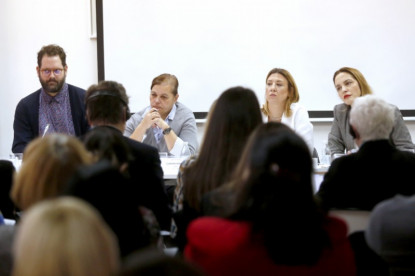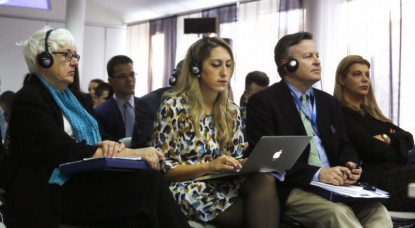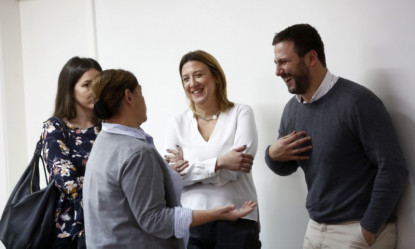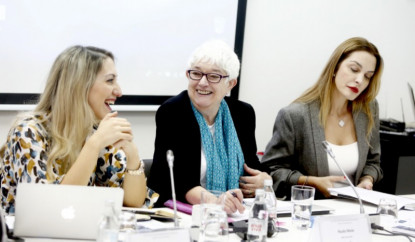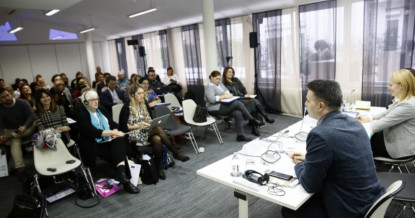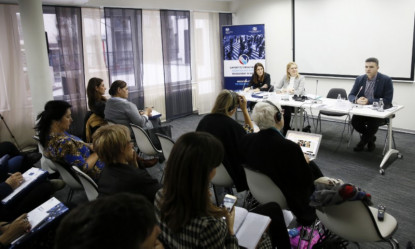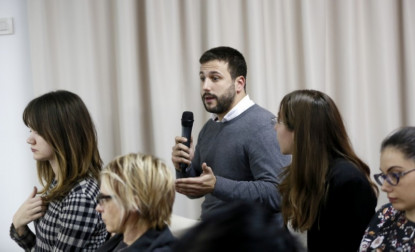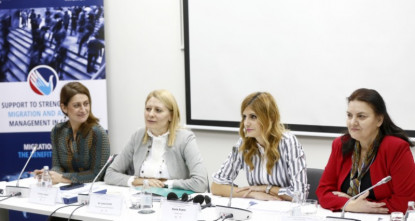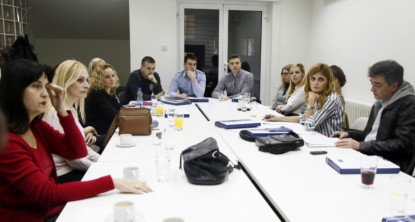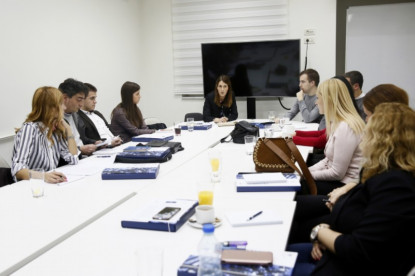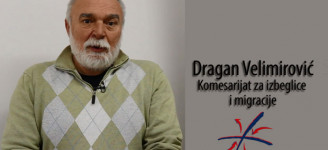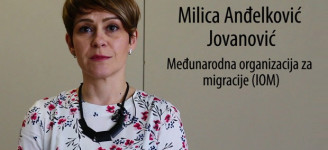Final conference “Challenges in practice and the direction of the future improvement of the asylum procedure in the Republic of Serbia” has been held.
Final conference “Challenges in practice and the direction of the future improvement of the asylum procedure in the Republic of Serbia was held in the Envoy Center on 13 December, 2018. This event was organized within the second stage of the project “Support to strengthening Migration and Asylum Management in Serbia” implemented by the International Organization for Migration (IOM) with the support of the British Embassy. Numerous representatives of state authorities and institutions, international organizations and civil sector dealing with asylum and migration issues on a daily basis, attended the event.
Conference comprised four panels and a final discussion which was preceded by working in small groups. The first panel was dedicated to challenges in practice in the field of asylum in the Republic of Serbia, the second one to challenges and novelties in the field of asylum at the European level, the third one to recognition of challenges and recommendations in consultative process which are important for further development of practice in the field of asylum, and the fourth one to the conclusions of challenges and directions of future improvement of the asylum procedure from the perspective of key institutions.
Participants were greeted by Stuart Taylor, the second secretary at the British Embassy in Serbia, responsible for migration, Lidija Marković, director to the International Organization for Migration office in Belgrade (IOM), Biljana Braithwaite, AIRE Western Balkans Program Manager, and Tanja Azanjac Janjatović, Program Manager at the International Organization for Migration (IOM). Apart from greetings, you may find here some statements of key participants.
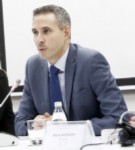 Stjuart Tejlor (Steward Taylor), the second secretary at the British Embassy in Serbia, responsible for Migration, opened the conference and greeted all participants.
Stjuart Tejlor (Steward Taylor), the second secretary at the British Embassy in Serbia, responsible for Migration, opened the conference and greeted all participants.
“My impression is that we made a significant shift from September, when the conference was held marking the start of the second stage of the project, but there is still a lot of work ahead of us. Changing the law is just the first step. Serbia is committed to the establishment of efficient and regulated system and makes great efforts to protect the most vulnerable people who need help. It is particularly important to support professionals who meet migrants in the field to understand the impact of amended laws on all people, all parts of the system and services provided. It is essential to create and secure resources, sophisticated tools, build capacities, and our goal is to help you together with our colleagues from the International Organization for Migration to carry out such changes. I hope that we at least partially managed to do it. In the past three months we made a great shift and I believe that we are not going to stop there”.
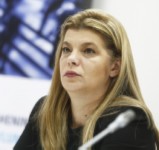
Lidija Marković, director to the International Organization for Migration office in Serbia (IOM), opened the conference.
“Thanking the donors and all partners who were with us at this stage of the project, ranging from civil sectors to state authorities and institutions and international institutions, I would like to express satisfaction with the results achieved, primarily with regard to the improvement of asylum procedure in Serbia and building capacity of the Asylum Office. A handbook on migrants protection, online course on asylum and migrations, and national consultative process on implementation of new laws in the field of asylum, proved to be very relevant and valuable for us. Migration management is a common task that no one can do on their own. We have to work together and therefore I invite you to continue participating actively in this process “.

Biljana Braithwaite, AIRE Western Balkans Program Manager, said that practically all countries in the region have laws in almost all fields, but, being not easy to harmonize with the international norms and standards, they are not easy to implement.
“At the previous stage of the project, from September 2017 to March 2018, we prepared a handbook and an online course in cooperation with the IOM’s office in Serbia and a team of international and local experts. At the second stage of the project we provided support in the application of new legal solutions in the area of asylum and migration. Besides providing support to service providers through workshops and mentorship programs, we worked on an additional handbook and online course which are will focus on those fields which have been made topical by the change of legislation“.
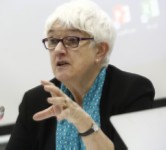
Nuala Mole, senior lawyer and founder of the AIRE center, argues that changes that are currently happening bring new challenges, particularly when it comes to provision of full protection of migrants in line of international rules and standards.
”When countries lose control over migrant routes, there is an increasing risk of multiplication of smugglers who identify and control those routes. This partially explains the fact that a number of interested ones for voluntary assisted return is on the rise, which is quite logical. When people remain without money, the smugglers do not transfer them to desired countries because they cannot pay it, so they decide to return to their home countries. We don’t know whether they are going to give up Europe or try to raise money for another attempt, but it is certain that we need to help all those who decide to take voluntary return “.
She also reflected on the issue of children who travel unaccompanied, and particularly on the fact that young men of undetermined age, who, as they stress, are obviously not children, fall into this group of children.
”When it comes to this category of migrants, one should be especially cautious, but a protection in line with the international standards should be certainly provided to them“.
 Markela Papadopuli, European Litigation Coordinator for the AIRE center, the coauthor of the Handbook on European Asylum and Migration Standards, announced a new issue of the handbook and online course for the period of January-February next year, which will built on the foundations of the previous publication.
Markela Papadopuli, European Litigation Coordinator for the AIRE center, the coauthor of the Handbook on European Asylum and Migration Standards, announced a new issue of the handbook and online course for the period of January-February next year, which will built on the foundations of the previous publication.
„The new handbook is an overview of all key international laws and international practice in the area of asylum. While in the first edition we dealt with the basic instruments of protection of asylum seekers rights, the second one is dedicated to the rules and standards applicable for the accelerated border asylum procedures, special guarantees for vulnerable categories of asylum seekers, deprivation of freedom, persecution and family reunification, legal remedy…A clear division was made in the Handbook between directives, which makes it possible to align it with the local legislation, and regulations dealing with the standards and have to be applicable at the territory of the entire Europe, so that it makes no difference to migrants which country they are in. All these things are very important for Serbia which as an EU candidate country has to adjust to the standards “.
She stressed that it would be invaluable for all the parties dealing with the issue of asylum and migration to read the handbook, as thanks to that they could make decisions and execute laws according to international and European standards which protect human rights.
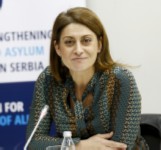
Emilija Joksić, head of the Asylum Office at the Ministry of Interior of the Republic of Serbia, stressed that the major challenge for them was insufficient staffing and added that the situation is getting better.
“Forming two departments, one for determining asylum right, and the other for collecting documents and data about the country of origin, will enable securing full protection of rights in the field of asylum procedure and dedicating ourselves to every and each particular case. It would be good if the office had its own translators, as the translators provided through UNHCR are not always available “.
She mentioned that the major progress was better coordination and communication with the Asylum Commission and Administrative Court, primarily thanks to workshops delivered within the second stage of the project “Support to strengthening Migration and Asylum Management in Serbia”.
”Better coordination has been established between us and now we can say that we go in the same direction, though there is still a need to take the common stance about certain things“.
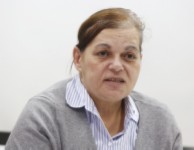 Svetlana Velimirović, Assistant Commissioner for Refugees and Migrations (KIRS), spoke about novelties and challenges in implementation of laws from the point of view of the Commissariat.
Svetlana Velimirović, Assistant Commissioner for Refugees and Migrations (KIRS), spoke about novelties and challenges in implementation of laws from the point of view of the Commissariat.
”It is important to set clear criteria for monitoring law implementation and monitoring all indicators, as it was important to us to develop and adopt new procedures, clear guidelines and instructions. It is good that in the next stage we are going to get resources for monitoring migrants fluctuation through EASO and UNHCR, while we still have pending issue of establishing flexible mechanisms to ensure availability of all resources in the shortest possible time.
Numerous challenges are ahead of us, and they concern parts of the law. In the future the focus will be on the issue how to implement what is envisaged, how to ensure assisted voluntary return, how to achieve better coordination between state authorities, civil sector and international organizations “.
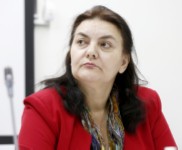 Zorica Kitanović, the judge of the Administrative court argues that new laws define better obligations of aliens, they are better aligned with the EU laws, but stresses that there are provisions that need to be changed due to the administrative procedure.
Zorica Kitanović, the judge of the Administrative court argues that new laws define better obligations of aliens, they are better aligned with the EU laws, but stresses that there are provisions that need to be changed due to the administrative procedure.
”My colleagues and I believe that there should not be any deviations or dilemmas. It would also be good if the judgments can be an operating model for future colleagues. Administrative court has few cases in the field of asylum, but they are very complex and require serious preparation, and we rely both on national legislation and practice of the European Court of Human Rights. Problem is that we do not have routine or enough experience or relevant court practice, so we think that we need additional education and specializations. It would mean a lot to us to have in the future seminars organized for ombudsmen for children, persons with special needs, for determining status of extramarital partner for persons in transit while in asylum procedure...“
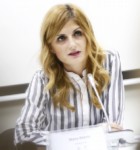 Stana Ašanin, the president to the Asylum Commission, after three months leading the team, estimates that the things are going in the right direction.
Stana Ašanin, the president to the Asylum Commission, after three months leading the team, estimates that the things are going in the right direction.
”We decide by majority rule, which means that we will always try to analyze every case in detail and pass the best possible and most correct decision. This is not simple, as at any moment we have to take care about protection and preservation of human rights and at the same time we have to care about the interests of our country. Major challenge we face is the ununiformed practice and harmonization of regulations in the procedure, so I believe that the new handbook will be invaluable help for the further work “.
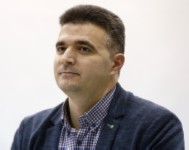
Doc. Dr. Vuk Cucić, Assistant Professor at the Law School of the Belgrade University, believes and all participants agree with him, that cooperation between authorities need to be constantly improved.
“I am well informed about the issues the Asylum Office staff is facing, which are concerning the procedure. I reckon that we often waste resources and time and we should change practice that is not in the interest of our country whose interest we have to take care of. Asylum office employees trained for leading interviews, go to the field to meet every person who expressed asylum intention, not only for migrants who applied for asylum, therefore they waste their valuable time. I believe that we have to develop mechanisms and procedures which would include both Border police staff and KIRS representatives from receiving centers. That would result into interviewing only persons who submitted their application for the asylum.
It is not right that migrants who expressed asylum intention are considered asylum seekers if they do not seek the asylum. At the moment when they declare that they do not want to seek the asylum the law on aliens should apply to them. We cannot help someone who does not want help and who does not want to respect our rules “.
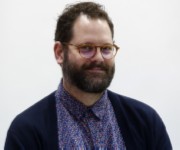 Marko Perović, the Coordinator for the protection of Migrants at IOM Serbia, indicated that there is a growing number of persons applying for the program of voluntary assisted return.
Marko Perović, the Coordinator for the protection of Migrants at IOM Serbia, indicated that there is a growing number of persons applying for the program of voluntary assisted return.
”Even though we face numerous challenges regarding voluntary return, I have to stress that in 2016 we had 100 applications, in 2017 we had 240 applications and by December as many as 300 applications. Although we see asylum as a materialization of human rights and right of every man to seek asylum, I believe that voluntary return is more human as it is implemented in line with the needs of migrants. It would be important to define in practice precise deadlines for extension of return “.

Ljubimka Mitrović, Protection sector officer, UNHCR, as many other participants at the conference, stressed the significance of coordination, multisectoral approach and good cooperation of all parties in the field of asylum.
”It is particularly important when it comes to vulnerable migrant categories, especially in cases of children who travel unaccompanied. I believe that multisectoral activities are necessary which would make state authorities committed to the issue of unaccompanied children so that the entire asylum procedure should be fully implemented. We need a clear protocol for acting in such cases, from the first to the last step, i.e. from identification to integration into the society, which means that all parties have be involved from border officers to the Center for social work.“
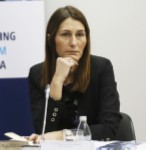
Miroslava Jelačić, the legal expert with the Group 484, is happy with the progress made in the field of asylum.
”Workshops organized for the Asylum office staff proved to be very useful as they included key topics. They discussed the level of capacity building, as one of the key issues, differentiation of categories of migrants, basic principles of approach to migrants, non- refoulment, definition of protection, deprivation of freedom...
In the future we should deal with the issue of uneven level of knowledge of stakeholders, linking of legal norms to local practice and bringing them closer to judges“.
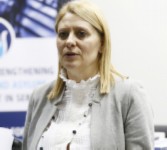 Prof. Dr. Ivana Krstić, Associate Professor of the Law School of the Belgrade University and member of the Asylum Commission, upon completion of discussion which was held in small groups, summarized final conference recommendations given by the participants.
Prof. Dr. Ivana Krstić, Associate Professor of the Law School of the Belgrade University and member of the Asylum Commission, upon completion of discussion which was held in small groups, summarized final conference recommendations given by the participants.
”We concluded that in the new Law on asylum concept of the safe third country should be regulated in a new way, that we need continuous education which will be planned by competent authorities according to their experience and needs and that the Asylum Office, Asylum Commission and Administrative Court capacities need to be improved. We agreed that resources for training and technical capacity improvement must not be spent without a good plan, that a consultative process is important for all of us and that it would be good to discuss issues and dilemmas about practice and different interpretation at the joint round tables, consultations and workshops“.





